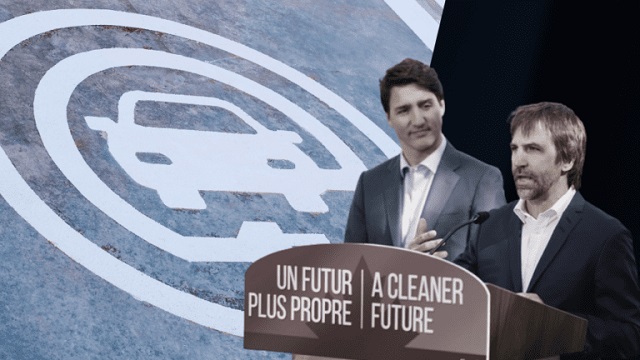Business
The carbon tax’s last stand – and what comes after

From Resource Works
How a clever idea lost its shine
For years, Canada’s political class sold us on the idea that carbon taxes were clever policy. Not just a tool to cut emissions, but a fair one – tax the polluters, then cycle the money back to regular folks, especially those with thinner wallets.
It wasn’t a perfect system. The focus-group-tested line embraced for years by the Trudeau Liberals made no sense at all: we’re taxing you so we can put more money back in your pocketbooks. What the hell? If you care so much about my taxes being low, just cut them already. Somehow, it took years and years of this line being repeated for its internal contradiction to become evident to all.
Yet, even many strategic conservative minds could see the thinking had internal logic. You could sell it at a town hall. As an editorial team member at an influential news organization when B.C. got its carbon tax in 2008, I bought into the concept too.
And now? That whole model has been thrown overboard, by the very parties had long defended it with a straight face and an arch tone. In both Ottawa and Victoria in 2025, progressive governments facing political survival abandoned the idea of climate policy as a matter of fairness, opting instead for tactical concessions meant to blunt the momentum of their foes.
The result: lower-income Canadians who had grown accustomed to carbon tax rebates as a dependable backstop are waking up to find the support gone. And higher earners? They just got a tidy little gift from the state.
The betrayal is worse in B.C.
This new chart from economist Ken Peacock tells the story. He shared it last week at the B.C. Chamber of Commerce annual gathering in Nanaimo.
 Ken-Peacock- B.C. Chamber of Commerce annual gathering in Nanaimo.
Ken-Peacock- B.C. Chamber of Commerce annual gathering in Nanaimo.
What is shows is that scrapping the carbon tax means the poor are poorer. The treasury is emptier.
What about the rich?
Yup, you guessed it: richer.
Scrubbing the B.C. consumer carbon tax leaves the lowest earning 20 percent of households $830 per year poorer, while the top one-fifth gain $959.
“Climate leader” British Columbia’s approach was supposed to be the gold standard: a revenue-neutral carbon tax, accepted by industry, supported by voters, and engineered to send the right price signal without growing the size of government.
That pact broke somewhere along the way.
Instead of returning the money, the provincial government slowly transformed the tax into a $2 billion annual cash cow. And when Mark Carney won the federal election, B.C. Premier David Eby, boxed in by his own pledge, scrapped the tax like a man dropping ballast from a sinking balloon. Gone. No replacement. No protections for those who need them most.
Filling the gas tank, on the other hand, is noticeably cheaper. Of course, if you can’t afford a car that might not be apparent.
Spare a thought for the climate activists who spent 15 years flogging this policy, only to watch it get tossed aside like a stack of briefing notes on a Friday afternoon.
Who could not conclude that the environmental left has been played. For a political movement that prides itself on idealism, it’s a brutal lesson in realpolitik: when power’s on the line, principles are negotiable.
But here’s the thing: maybe the carbon tax model deserved a rethink. Maybe it’s time for a grown-up look at what actually works
With B.C. now reviewing its CleanBC policies, here’s a basic question: what’s working, and what’s not?
A lot of emission reductions in this province didn’t come from government fiat. They were the result of business-led innovation: more efficient technology, cleaner fuels, and capital discipline.
That, plus a hefty dose of offshoring. We’ve pushed our industrial emissions onto other jurisdictions, then shipped the finished goods back without attaching any climate cost. This contradiction particularly helped to fuel the push to dump carbon pricing as a failed solution.
The progressives’ choice was made once the anti-tax arguments could no longer be refuted: to limit losses it would be necessary to deep six an unpopular strand of the overall carbon strategy. This, to save the rest. That’s why policies like the federal emissions cap haven’t also been abandoned.
To give another example, it’s also why British Columbia’s aviation sector is in a flap over the issue of sustainable aviation fuel. Despite years of aspirational policy, low emissions jet fuel blends remain more scarce than a long-haul cabin upgrade. The policy’s designers correctly anticipated that refiners would never be able to meet the imposed demand, and so as an alternative they provided a complex carbon credit trading scheme that will make the cost of flying more expensive. For those with a choice, nearby airport hubs in the United States where these policies do not apply will become an attractive alternative, while remote communities that have no choice in the matter will simply have to eat the cost. (Needless to say, if emissions reduction is your goal this policy isn’t needed anyways, since the decisions that matter in reducing global aviation emissions aren’t made in B.C. and never will be.)
I’m not showing up to bash those who have been genuinely trying to figure things out, and found themselves in a world of policy that is more complicated and unpredictable than they realized. Simply put, the chapter is closing on an era of energy policy naïveté.
The brutally honest action by Eby and Carney to eject carbon taxes for their own political survival could be read as a signal that it’s now okay to have an honest public conversation. Let’s insist on that. For years now, debate has been constrained in part by a particular form of linguistic tyranny, awash in terminology designed to cow the questioner into silence. “So you have an issue with clean policies, do you? What kind of dirty reprobate are you?” “Only a monster doesn’t want their aviation fuel to be sustainable.” Etc. Now is the moment to move on from that, and widen the field of discourse.
Ditching bad policy is also a signal that just maybe a better approach is to start by embracing a robust sense of the possibilities for energy to improve lives and empower all of the solutions needed for tomorrow’s problems. Because that’s the only way the conversation will ever get real.
Slogans, wildly aspirational goal setting and the habit of refusing to acknowledge how the world really works have been getting us nowhere. Petroleum products will continue to obey Yergin’s Law: oil always gets to market. China and India will grow their economies using reliable energy they can afford, having recently approved the construction of the most new coal power plants in a decade amid energy security concerns. Japan, which has practically worn itself out pleading for natural gas from Canada, isn’t waiting for the help of last-finishing nice guys to guarantee energy security: today, they are buying 8% of their LNG imports from the evil Putin regime.
Meanwhile, we’re in the worst of both worlds: our courageous carbon tax policy that was positioned as trailblazing not just for B.C. residents but for the world as a whole – climate leadership! – is gone, the poorest are puzzling over why things feel even more expensive, and nobody knows what comes next.
Business
Senator wants to torpedo Canada’s oil and gas industry

From the Fraser Institute
Recently, without much fanfare, Senator Rosa Galvez re-pitched a piece of legislation that died on the vine when former prime minister Justin Trudeau prorogued Parliament in January. Her “Climate-Aligned Finance Act” (CAFA), which would basically bring a form of BDS (Boycott, Divestment, and Sanctions) to Canada’s oil and gas sector, would much better be left in its current legislative oblivion.
CAFA would essentially treat Canada’s oil and gas sector like an enemy of the state—a state, in Senator Galvez’ view, where all values are subordinate to greenhouse gas emission control. Think I’m kidding? Per CAFA, alignment with national climate commitments means that everyone engaged in federal investment in “emission intensive activities [read, the entire oil and gas sector] must give precedence to that duty over all other duties and obligations of office, and, for that purpose, ensuring the entity is in alignment with climate commitments is deemed to be a superseding matter of public interest.”
In plain English, CAFA would require anyone involved in federal financing (or federally-regulated financing) of the oil and gas sector to divest their Canadian federal investments in the oil and gas sector. And the government would sanction those who argue against it.
There’s another disturbing component to CAFA—in short, it stacks investment decision-making boards. CAFA requires at least one board member of every federally-regulated financial institution to have “climate expertise.” How is “climate expertise” defined? CAFA says it includes people with experience in climate science, social science, Indgineuous “ways of knowing,” and people who have “acute lived experience related to the physical or economic damages of climate change.” (Stacking advisory boards like this, by the way, is a great way to build public distrust in governmental advisory boards, which, in our post-COVID world, is probably not all that high. Might want to rethink this, senator.)
Clearly, Senator Galvez’ CAFA is draconian public policy dressed up in drab finance-speak camouflage. But here’s what it would do. By making federal investment off-limits to oil and gas companies, it would quickly put negative pressure on investment from both national and international investors, effectively starving the sector for capital. After all, if a company’s activities are anathema to its own federal regulators or investment organs, and are statutorily prohibited from even verbally defending such investments, who in their right minds would want to invest?
And that is the BDS of CAFA. In so many words, it calls on the Canadian federal government to boycott, divest from, and sanction Canada’s oil and gas sector—which powers our country, produces a huge share of our exports, and employs people from coast to coast. Senator Galvez would like to see her Climate-Aligned Finance Act (CAFA) resurrected by the Carney government, whose energy policy to-date has been less than crystal clear. But for the sake of Canadians, it should stay dead.
Automotive
Opposition Conservatives fail in attempt to “Pull the Plug” on Carney’s Electric Vehicle Mandate

From Conservative Party Communications
After a Lost Liberal Decade of rising costs and slow growth, Mark Carney wants you to think his government has moved on from Justin Trudeau’s failed policies.
Unfortunately for Canadians, Carney has no interest in scrapping one of his predecessor’s most reckless and costly ideas: a zero-emissions vehicle (ZEV) mandate starting next year that will ultimately ban Canadians from buying gas-powered cars by 2035.
As the required percentage of ZEV sales increases each year, the government wants to force manufacturers and importers to buy costly credits of up to $20,000 for every EV they are short of the Liberals’ quota – a huge expense that will ultimately be passed on to, and paid by Canadian consumers.
That’s why Conservatives have introduced a motion to end this harmful scheme, ensuring Canadians can continue to buy the kind of car they need at a price they can afford.
EVs are great for many families, who should always be free to purchase the vehicle of their choice. But for many Canadians – who live in cold environments or travel long distances – they can be practically useless, especially without the infrastructure to power them.
One government report estimated that changes to Canadian infrastructure required to support a transition to ZEVs could cost up to $300 billion by 2040. On top of the costs already imposed on manufacturers and buyers, this policy will require billions in new tax dollars and government debt.
No wonder one 2024 survey found two thirds of Canadians find the 2035 target is unrealistic.
As unjust tariffs threaten an automotive sector which contributes billions to our GDP, the Liberals continue to put their elitist, top-down ideology ahead of the livelihoods of hundreds of thousands of proud Canadian workers.
While Carney talks about change, Conservatives are here to deliver. That’s why we’re fighting to repeal the ZEV mandate, scrap the industrial carbon tax and cancel Liberal fuel standards. We trust Canadians – not Ottawa’s Liberal elite – to make the best decisions for themselves and their families.
It’s time to put Canadians back in the driver’s seat.
-

 Alberta2 days ago
Alberta2 days agoCentral Alberta MP resigns to give Conservative leader Pierre Poilievre a chance to regain a seat in Parliament
-

 Alberta2 days ago
Alberta2 days agoCalls for a new pipeline to the coast are only getting louder
-

 Daily Caller2 days ago
Daily Caller2 days ago‘Not Held Hostage Anymore’: Economist Explains How America Benefits If Trump Gets Oil And Gas Expansion
-

 Business2 days ago
Business2 days agoCanada’s economic pain could be a blessing in disguise
-

 Censorship Industrial Complex1 day ago
Censorship Industrial Complex1 day agoJordan Peterson reveals DEI ‘expert’ serving as his ‘re-education coach’ for opposing LGBT agenda
-

 Alberta2 days ago
Alberta2 days agoAlberta pro-life group says health officials admit many babies are left to die after failed abortions
-

 Alberta1 day ago
Alberta1 day agoUnified message for Ottawa: Premier Danielle Smith and Premier Scott Moe call for change to federal policies
-

 Education2 days ago
Education2 days agoStudents can’t use AI to cheat on standardized tests







